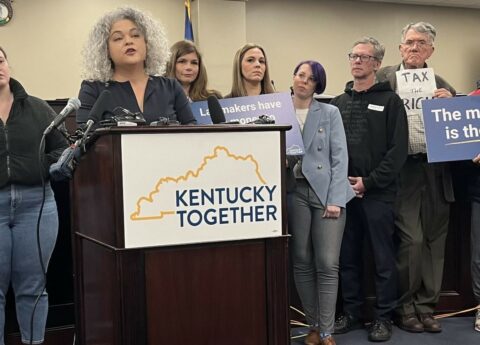Reducing Federal Deficits Without a Significant Revenue Increase Would Cost Kentucky Billions
22% reduction in federal aid to Kentucky under Ryan budget would mean more painful cuts to schools and other vital services
If significant new revenue isn’t included, upcoming efforts to reduce federal deficits would almost certainly damage Kentucky’s economic recovery and future economic growth by making drastic cuts to federal investments in schools, roads and bridges, safe communities, and family economic security.
The House-passed budget from Congressman Paul Ryan is an example of the kind of approach Congress would take if it rejects deficit reduction that includes revenues. Under Ryan’s plan, Kentucky would lose an estimated 22% or $330 million in federal funding for education, clean water, law enforcement, and other state and local services in 2014 alone (and $2.9 billion over the next nine years), according to a report released today by the Center on Budget and Policy Priorities, a non-partisan policy research organization based in Washington, D.C. Ryan’s plan also would shift other very large costs to states by reducing sharply federal funding for Medicaid (in addition to repealing the health reform law), and likely by cutting deeply funding for highway construction and other transportation projects.
“A deficit reduction plan based narrowly on budget cuts would harm Kentucky’s economy in the short- and long-term,” said Jason Bailey, director of the Kentucky Center for Economic Policy. “Unless Congress takes a balanced approach that also includes new revenues, it will damage Kentucky’s ability to educate our children, build roads and bridges, and have clean water and safe communities.”
Federal funding for states, counties, and cities very likely would be decimated by an unbalanced approach to deficit reduction in the next decade. That’s because there’s broad bipartisan agreement that significant deficit reduction is needed, but federal policy makers also agree in broad terms that deficit-reduction savings from other major parts of the budget – defense, Medicare and Social Security – should be limited during that period. Federal funding for states and local areas would thus be one of the few remaining sources of large potential savings.
These cuts likely would bring federal aid to state and local governments to historic lows. By 2021, under the Ryan budget, federal grant programs for states, counties, and cities likely would be less than half the average of the last 35 years.
These cuts would add to deep cuts Congress already made to state and local aid last year and severe cuts that Kentucky has made as a result of the recession to education and other services vital to economic growth. Kentucky’s 2013-2014 state budget included 8.4 percent cuts across state government with only a few exceptions. And the cumulative impact of 11 rounds of cuts to the state budget since 2008 is substantial—funding for many state functions has been reduced 15-30 percent or more.
Ryan Budget Cuts to Federal Funding for Kentucky Far Worse Than “Sequestration”
The funding cuts to states, counties, and cities under the Ryan budget proposal would far exceed the automatic cuts scheduled to begin in January, often referred to by the term sequestration. In 2014, the Ryan budget cuts would be three times as deep, inflicting far more damage than sequestration. In later years, as the sequestration cuts diminish but the Ryan cuts remain as deep, the difference would be even larger.
Specifically, the Ryan budget proposal likely would reduce federal funding in these areas in Kentucky:
- Education. Head Start, teacher quality programs, special education, and schools in high-poverty areas (Title 1) likely would face deep cuts.
- Transportation. Likely cuts would hurt Kentucky’s ability to build and repair roads, bridges, airports, and public transportation systems.
- Public safety. Kentucky would likely have less funding for disaster assistance and grants programs that help local police departments hire, train, and equip officers.
- Community development. Funds that help improve water and sewer systems and revitalize deteriorating neighborhoods likely would face cuts.
- Housing. Kentucky likely would be less able to provide rental assistance and heating and cooling assistance for low-income people, many of them elderly.
- Workforce. Kentucky would have fewer resources for workforce training and placement services and childcare assistance for low-income working parents.
- Health. Funding cuts would hinder Kentucky’s ability to keep community health centers open, provide mental health and substance abuse services, and give nutrition support to low-income mothers and young children.
“It is important that Congress work to enact a balanced deficit-reduction package that both includes new revenue and replaces the automatic budget cuts scheduled for January,” said Bailey. “Congress should avoid any unbalanced plans that would further deepen cuts in federal aid to states and hinder Kentucky’s ability to grow.”
###
The Center’s full report can be found here.



